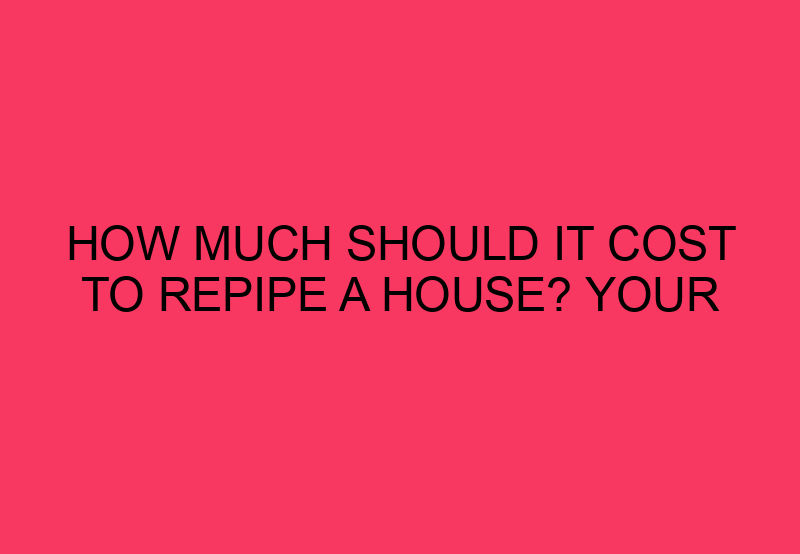Are you experiencing low water pressure or rusty water coming out of your faucets? Or are you simply tired of constantly patching up leaks in your outdated piping system? If so, it might be time to consider repiping your house. The cost of a repiping project can vary depending on several factors, but we have put together a guide to help you understand what to expect and what you should budget for to ensure a successful repiping project.
What is Repiping?
Repiping involves the removal and replacement of your home’s plumbing pipes and fixtures. A repiping project can range from replacing just a few pipes to an entire home plumbing system. This often includes pipes for water supply lines and drainage.
Repiping is necessary when your home’s pipes have aged, corroded, or become damaged beyond repair, causing leaks or other plumbing issues. It’s essential to address these issues because untreated leaks can lead to further and more extensive damage to your home, including mold growth, water damage, and structural damage.
Factors That Affect the Cost of a Repiping Project
Repiping is a significant home project that involves a significant investment. The cost of repiping depends on various factors, including:
1. Size of Your Home
The size of your home will determine the materials and labor required to get the job done. The larger your home, the higher the cost of repiping the house.
2. Type of Piping Material
The material you choose for repiping your home also affects the cost. Copper and PEX pipes are the most popular choices, but copper is more expensive than plastic PEX pipes. If your home already has copper pipes installed, switching to PEX pipes might require additional work to replace any fittings or valves.
3. Plumbing Layout
An extensive plumbing system in your home or complex plumbing layouts will make the repiping process more complicated and costly. This layout may require more time and materials than a simpler layout.
4. Condition of Existing Plumbing
The condition of your current plumbing can affect the cost of your repiping project. If your pipes have been affected by damage or wear, it may cost more to remove them and replace them.
5. Location and Accessibility
The location of your pipes can affect the cost to replace and repair them. If your pipes are in difficult-to-reach locations, additional labor and specialized tools may be required, which will impact the overall cost of repiping.
The Average Cost of Repiping A House
According to HomeAdvisor, the average cost to repipe a home is approximately $4,500-$13,000. For a two-bedroom home, this cost may range from $3,500 to $8,000. However, this price can vary considerably depending on the factors mentioned above.
The price of the project may also vary by regions. Your geographic location can directly impact the cost of materials and labor in your area. In addition, the complexity of the work and project timeline may also affect the overall cost.
Additional Costs to Consider
There may be additional costs that may pop up in the middle of your repiping project. These costs may include:
1. Permit Fees: Many cities and municipalities require a permit for repiping projects. The fee for these permits can range between $50 to $500, depending on where you live.
2. Drywall Repair: Repiping often involves cutting through walls to get access to the pipes. You may need to repair the drywall after the project, which can add a few hundred more dollars to the total cost.
3. Hidden Repairs: The older your home, the more likely you will encounter hidden repairs or problems along the way. For example, if your home has outdated electrical wiring, you may need to update the wires while repiping. Such extra tasks can require additional costs.
Choosing Your Contractor
Selecting a reputable and reliable contractor is crucial to ensure a successful repiping project. Look for contractors with experience in handling repiping projects. Seek recommendations from friends and family as well as online reviews and ratings to find a qualified plumbing contractor.
Additionally, ensure that the contractor is licensed, insured, and has proper documentation such as liability insurance, workers’ compensation, and licenses. Always get a written estimate for the total cost of the project before signing a contract. It should include all necessary materials, costs, fees, and timelines for completion.
Conclusion
The cost of repiping a home depends on several factors such as the size of your home, type of piping material, plumbing layout, location, and accessibility. The average cost of repiping a home typically ranges from $4,500 to $13,000. However, additional costs such as permit fees, drywall repairs, and hidden repairs may increase the costs. It’s essential to choose the right contractor by checking their credentials and experience. By budgeting accordingly and working with reputable professionals, you can ensure a successful and stress-free repiping project for your home.
